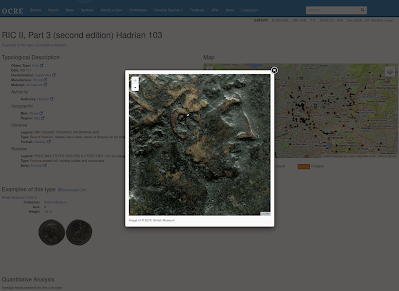I have received a major update from Richard Abdy, curator at the British Museum and author of the most recent RIC volume on Hadrian, which was published to OCRE in June of 2020. Nearly 2,300 coins from the British Museum have been linked to Hadrian type URIs in the new volume, an increase by about 2,000 over the relatively small number of Hadrianic coins the BM had previously contributed to OCRE. The photographic coverage of Hadrian types is nearly complete. There are, in fact, about 850 types where the British Museum specimen is the only photographed example: about one-quarter of all Hadrianic coin types.
Furthermore, I queried the BM's API for each coin to extract IIIF service URIs, when available. This extended to all of the BM's contributions to the Nomisma.org ecosystem (Iron Age, Hellenistic, and Roman coinage), and about 16,000 of the 72,000 total coins from the British Museum have zoomable IIIF images.
A British Museum example of Hadrian 103
The British Museum's API for individual objects is not publicized, but I happened upon it by looking at the console in Firefox to locate the British Museum's IIIF URI pattern (which is also not publicized). The ID portion of the object URI serves as the 'id' request parameter for the API, e.g., https://www.britishmuseum.org/api/_object?id=C_1872-0709-376.
The IIIF URL is 'zoom' property for each 'processed' in the 'multimedia' array. This is a relative path that should be appended to https://media.britishmuseum.org/iiif/. The other static jpg files paths are appended to https://media.britishmuseum.org/media/.
Frustratingly, the object metadata are not encoded in the JSON response as clean and machine-readable. It is possible to parse data from the escaped HTML in 'xtemplate', but it requires a little clean-up. I was able to parse the measurements for the Hadrianic coins from the xtemplate for the Hadrianic coins in OpenRefine, since they weren't in the the spreadsheet export I had received.










 Stumble It!
Stumble It!

No comments:
Post a Comment